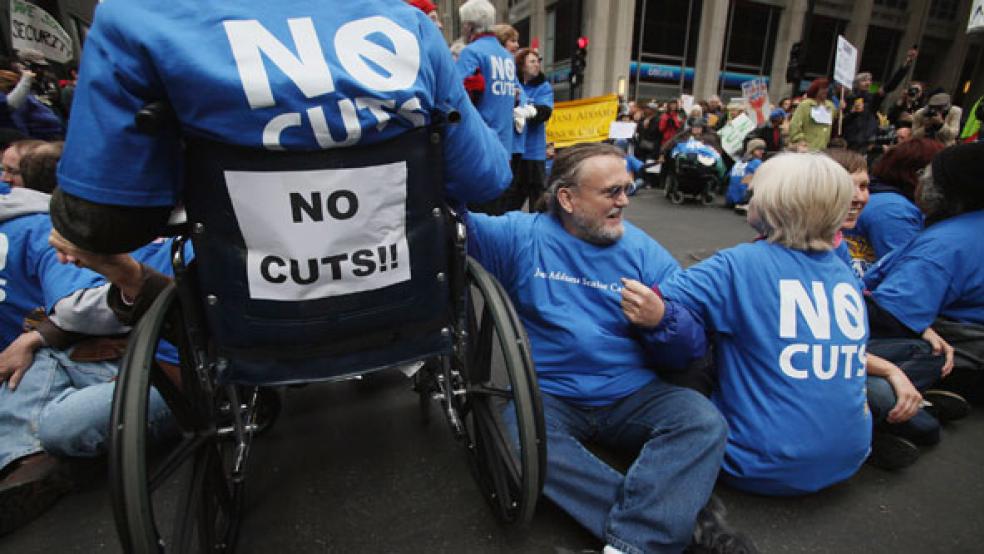The ad radiates pure populism. But instead of scruffy Occupy Wall Street demonstrators, it features a large crowd of gray-haired protesters pillorying lawmakers’ proposals for paring future Social Security payouts to help reduce long-term spending.
“We are 50 million seniors who earned our benefits, and you will be hearing from us today – and on Election Day,” an actor intoned from the front of the crowd.
The senior lobby AARP’s latest television barrage is just part of the larger grass roots campaign that was launched recently by an array of senior citizen and public interest groups aimed at beating back any attempt by members of the Super Committee to change the cost-of-living adjustment factor for Social Security. Shifting to a less generous measure of inflation would cut $112 billion or about 7 percent from projected beneficiary payouts over the next decade.
The proposal -- popular with many policy analysts as a more accurate portrayal of consumer prices -- remains one of the most attractive revenue raising measures in some politicians’ and deficit-cutters’ playbooks. Beyond cutting Social Security costs, it would reduce future claims in a wide range of government programs that benefit mostly the poor, including Head Start, school lunch programs, and home heating assistance. It would also raise $72 billion in new tax revenue by slowing upward adjustments in income tax brackets, thus throwing more taxpayers into higher brackets.
With less than two weeks to go before the Super Committee’s congressionally imposed Thanksgiving deadline to recommend at least $1.2 trillion in deficit cuts over the next 10 years, some Republicans on the committee have broken with their “no new taxes” pledge. Those members reportedly have moved toward the alternative price measure, known as chained CPI (consumer price index), as part their offer to raise an estimated $300 billion in new tax revenue over the next decade.
While Democrats on the committee are staying mum on the issue, the grassroots campaign by key elements of their political base has made it extremely difficult for them to embrace the proposal. Last week, thousands of demonstrators marched on the Boston office of Sen. John Kerry, D-Mass., demanding he reject cuts in Social Security and other social programs. “Though we don't have armies of corporate lobbyists, we have passionate people who belong to all political parties, including independents, who don't want to see their benefits cut,” said Joshua Rosenblum, a spokesman for Social Security Works, which helped organize the demonstrations.
About one-third of senior citizens derive all of their income from Social Security benefits. While many seniors have pensions, other retirement savings; and own their own homes, those assets were severely depleted during the financial collapse. About half of families headed by someone over 65 today live on less than $18,500 a year.
Seniors were also hit by rising health care bills in recent years, since Medicare only pays for 75 percent of doctor bills. The Census Bureau’s experimental measure for poverty, which was released last week, showed 15.9 percent of seniors were living in poverty when higher health care costs were taken into account.
“Today, every dollar of the average Social Security benefit of about $14,000 is absolutely critical to the typical beneficiary,” AARP chief executive A. Barry Rand wrote in a letter http://www.aarp.org/about-aarp/press-center/info-11-2011/aarp-to-super-committee-chained-cpi-will-hurt-seniors.html to every member of the Super Committee last week. “Reducing Social Security benefits by moving to a chained consumer price index to reduce the deficit . . . is inappropriate and unwarranted.”
Nearly every effort to come up with a long-term plan to reduce projected federal deficit, including the president’s fiscal commission chaired by Democrat Erskine Bowles and former Republican Senator Alan Simpson of Wyoming, has included the measure. “Chained CPI is something that needs to be there because we need to do something to slow down the growth in entitlements, and it’s a more accurate measure of inflation,” said James Kessler, the chief of government relations for Third Way, a centrist think tank.
Yet given the mounting pressure, it’s unlikely that changing the Social Security formula will be included in any final package the Super Committee can agree to unless there are significant other new revenues. Democrats on the committee last week floated a $2 trillion “grand bargain” that included $1 trillion in new revenue to go along with $1 trillion in budget cuts.
Should the Super Committee see its way clear to making such a compromise, it’s likely President Obama would sign such a measure. The administration included changing the inflation formula in its talks with House Speaker John Boehner, R-Ohio, last summer.





